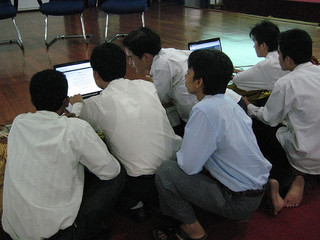The Cambodian government is enforcing a circular drafted earlier this year which requires Internet cafes to set up surveillance cameras and to register callers.
Based on an unofficial translation made by Jinja, the government said the circular was made in response to the rising number of cyber crimes in the country:
Past experiences of offense investigation and suppression have shown that, criminals and offenders always used telecommunications services such as mobile phones, fixed phones, VoIP and Internets as a means to commit terrorisms, trans-boundary crimes, robberies, kidnapping, murders, drug trafficking, human trafficking, economic offenses, illegal installment of and illegal corporation of all forms of telecommunications service, broadcasting of obscene pictures and debauchery, which affect national customs, traditions and social good moral values.
The provision below mandates telephone and internet stations to put CCTV cameras in their areas:
All telecommunications operators, sales outlets and distributors are obliged to register their business at local authorities. Meanwhile, all locations serving telephone services and Internet shall be equipped with closed circuit television camera and shall store footage data of users for at least 03 months. Telephone service corporation owners along public roads shall record National Identity Cards of any subscriber.
The circular could be a model for a more comprehensive cyber legislation which the government plans to enact this year. Jinja reports that no violator has been arrested yet in connection with the circular:
So far I have seen no report of anyone being fined or arrested for refusing to comply. This circular sets a precedent for regulating the use of the internet which may be followed up by an actual law enacted by the National Assembly.
The circular is seen by some netizens as a threat to internet freedom. Clothilde Le Coz interviews several Cambodian writers who expressed their concern over attempts by the government to regulate online behavior.
Cambodian Law Blog confirms news reports that the government is drafting an anti-cybercrime law:
The Cambodian government seems to have had enough of false information on the internet. It is drafting a law that will make it illegal to lie on the internet.
Does a writer need to know the information is false? Does he have to intend to cause harm through the false information?
False speech is a problem that every government will need to address at some point or another.
It will be interesting to see how the Cambodian government deals with this difficult issue.
LTO Cambodia believes that internet freedom is still very much practiced and enjoyed in Cambodia but notes that “free space has slowly been shrinking” in recent years:
It can even be said that Cambodia has some of the freest Internet in the region. Still, over the last three years, that free space has slowly been shrinking, some ‘political’ websites have been blocked and the government has repeatedly expressed the desire to enact some sort of Internet law or official regulation.
The blogger also provides a good summary and history of internet censorship cases in Cambodia. Meanwhile, the Cambodian Center for Human Rights advises the government that instead of controlling new media, it should facilitate improved access, better broadband services, and greater online freedom:
…despite the (government’s) recent announcement that they are drafting a cyber law, it seems highly unlikely that they will be able to unilaterally censor the internet and mobile phones, primarily due to a lack of the financial and human resources that are needed in order to do so. Furthermore, as Cambodian citizens become more technologically aware, many users will be able to find a way of accessing restricted sites through the use of proxy servers.
The recent moves by the (government) to restrict internet and mobile phone use in Cambodia, as outlined above, indicate a desire within government to control new media – particularly the internet. It is hoped however that, as internet penetration in Cambodia is still very low, the (government) will refrain from imposing further restrictions on the internet and spending its limited resources on censoring online content and debate. Similarly, it is hoped that the (government) will refrain from steps aimed at preventing the use of mobile phones as a medium to communicate important civic and political messages.
The government position with regard to Internet freedom has been presented already to the global community. Although, it was a Chinese official who articulated the stand of several countries which included Cambodia. Nhklein quotes from the presentation:
The Internet is often used to propagate terrorism, extremism and racism, xenophobia even ideas of toppling legitimate authorities. Moreover, the Internet is used by some groups to distort fact, exaggerate situation and provoke violence in an attempt to acetate tension it appears and gain political benefits and is also used by criminals for outlawed activities and have access to facilities.
Mr. Moderator, all stakeholder of the Internet should make concerted efforts to prevent and combat the abuse of Freedom of Expression on the Internet. Internet users of all countries should respect the right and dignity of others; contribute to maintaining social stability and safeguarding national security. The Internet industry should act to foster a crime free, reliable and secure cyberspace, Governments should strengthen legislation in efforts of Internet regulation and law enforcement activities, with the aim of combating criminal activities. All countries should start as soon as possible to discussion on effective ways to promote international cooperation on Internet regulation for building safety and confidence on the Internet.








13 comments